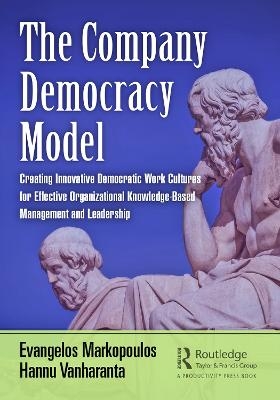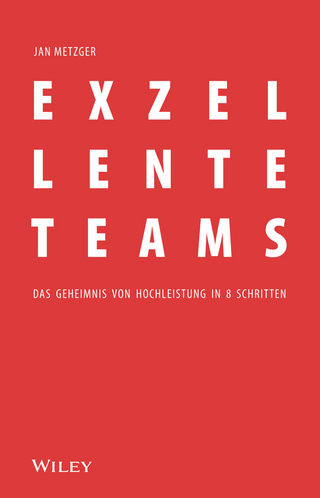
The Company Democracy Model
CRC Press (Verlag)
978-0-367-74562-2 (ISBN)
Company democracy is often misunderstood in the business context as democracy is usually related to politics. In this book, the authors present a different dimension. They focus first on democracy from an organizational culture perspective and then offer employees opportunities to understand and apply democracy from the company floor level.
The Company Democracy Model (CDM) is an industry-wide, practical methodology for knowledge management utilization under applied philosophical thinking. The model progresses through a framework in which an organizational evolutionary spiral method empowers the creation of knowledge-based democratic cultures for wise and effective strategic management and leadership. This new innovative methodology, supported with techniques and processes, can gain/create many ideas, insights, innovations, new products, and services that can benefit a company.
One purpose of using the model is to create a robust conceptual framework as a theoretical basis for a business strategy that promotes sustainable, continuous, and democratic development. Another purpose is to emphasize the importance of intellectual capital and compare capital-related and human-related business issues in shaping a company’s competitiveness, profitability, productivity, performance, and shared value. A third purpose is to use its symbolic infrastructure that builds solid democratic systems for viable business development and management. Finally, the described purposes give the reader new ideas to change and improve the design of business activities in a collective and modern democratic way.
Dr. Evangelos Markopoulos was born in 1967 in Kalamata, Greece. He is a scholar and an entrepreneur with expertise in Knowledge Management, Enterprise Engineering, Process and Project Management and Innovation & Entrepreneurship. He holds a BA in Computer Science with a minor in Mathematics, from the City University of New York, an MSc in Computer Science and Artificial Intelligence from New York University, and a Ph.D. on ICT Project and Investments Management from the University of Piraeus (Greece). He worked as a computer scientist in the USA at IBM (applications development), Siemens (systems engineer), and Bell Laboratories of AT&T (artificial intelligence and systems researcher). For nearly 20 years he was the CEO of EMPROSS Strategic IT consultants where he delivered projects in Software Engineering, Quality, and Project Management around the world. He invented and applied the ARIADNE Software Project Management Methodology for Software Development and Software Acquisition projects. As an academic, he taught, and still teaches, in universities such as the University College London (UCL), Queen Mary University of London (QMUL), Turku University of Applied Sciences (TUAS), City University New York, (CUNY), University of Essex, Royal Holloway University of London, SOAS-School of Oriental & African Studies, and Hult International Business School. He won the 2018 and 2020 HULT Prize Global Social Innovation competition at the UN with his UCL and QMUL students respectively. He is also part of the Clinton Global Initiative University (CGI-U) for sustainable and social innovation. Since 2018 his research is focused on the integration of advanced technologies with strategic management and corporate digital transformation. He works with technologies such as Metaverse, Virtual Reality, Serious Games and Gamification, Artificial Intelligence, Expert Systems, Neural Networks, and Cognitive Science in business applications. He has over 150 articles and papers published in international journals and conferences. Dr. Hannu Vanharanta was born in 1949 in Pori, Finland. He enrolled in 1967 at Åbo Akademi University, Turku, Finland, where he earned an M.Sc. degree in Chemical Engineering. He began his professional career in 1973 as a technical assistant at the Turku office of the Finnish Ministry of Trade and Industry. He then entered the engineering industry and gained valuable practical experience in many fields of industrial management. During 1975–1992 he worked for several Finnish international engineering companies, including Jaakko Pöyry (now AFRY), Rintekno, and Ekono as a process engineer, section manager, and leading consultant. During 1992– 1995 he was a researcher at the Institute for Advanced Management Systems Research. In 1995 he earned his Ph.D. degree in Industrial Management at Åbo Akademi and started his academic career. From 1995–1996 he was a professor in Business Economics at the University of Joensuu, Finland. In 1996–998 he served as professor in Purchasing and Supply Chain Management at the Lappeenranta University of Technology, Finland. From 1998 to 2016 he was a professor of Industrial Management and Engineering at the Tampere University of Technology, Pori Campus, Finland. Since retiring from the Tampere University of Technology, he has held visiting professorships at Poznan University of Technology, Poland, and Vaasa University, Finland. His research interests are Strategic Management, Human Resource Management, Knowledge Management, Financial Analysis, Decision Support Systems, and Executive Information Systems. His particular interests are in knowledge discovery and data mining. He has published many articles on financial analysis as well as text analysis as a result of his research experience. The ultimate goal of his research is to synthesize quantitative and qualitative/ linguistic data/information/knowledge for strategic decision-making. He has had over 300 articles and papers published in international journals and conferences.
List of Figures.........................................................................................xvii
List of Tables...........................................................................................xxv
Preface....................................................................................................xxvii
Acknowledgments.................................................................................xxxi
Authors...................................................................................................xxxv
Book Structure....................................................................................xxxvii
Section 1 APPLIED PHILOSOPHY
1 Science and Theory Precede Practice: A Scientific
Framework for the Applied Philosophy Approach in
Management and Leadership
Executive Summary.....................................................................................3
2 Delphic Maxims’ Ontology-Based Taxonomies for Applied
Philosophy: An Interpretation of the Ancient Hellenic
Philosophy in Business and Governance Management and
Leadership..................................................................................21
3 Visualization of the Wisdom Cube: Wisdom Space for
Management and Leadership......................................................41
4 The Company Democracy Culture: Understanding Culture
and Dynamics.............................................................................57
5 Dimensions in Company Performance: The Power of
Co-Evolution................................................................................79
6 Managing and Leading Democratically: Achieving
Democratic Balance....................................................................97
Executive Summary...................................................................................97
SECTION 2 HUMAN FOCUS IN LIVING SYSTEMS
7 The Holistic Concept of Man in the Business Environment:
The Concepts We Live By.......................................................... 119
8 The Circles of Mind Metaphor: Actors on the Stage of
Consciousness...........................................................................131
9 Harnessing Modern Knowledge Systems: Applying
Knowledge Frameworks........................................................... 151
10 The Cross-Scientific Approach for Human-Compatible
Systems: Acting with Modern Decision Tools...........................169
11 Agility Application, Ontology, and Concepts in a Technology
Company Context: Agility Boosts Collective Wisdom................... 185
SECTION 3 THE COMPANY DEMOCRACY MODEL
12 The Company Democracy Model for Organizational
Management and Leadership Strategies: Democratic
Innovation for Competitiveness and Extroversion....................207
13 The Levels of the Company Democracy Model: A Spiral
Co-evolution..............................................................................231
14 Human Perception, Interpretation, Understanding,
and Communication of Company Democracy: Building
Co-opetitive Ecosystems...........................................................259
15 The Company Democracy Model for Human Intellectual
Capitalism and Shared Value Creation: Toward Added
Value and Circular Economies..................................................277
16 Maturity Spaces for Company Democracy: The Seven
Clouds of Glory.........................................................................293
17 The Dynamics of Company Democracy Culture:
Enlightening the Black Hole in Knowledge Management........313
Executive Summary................................................................................. 313
18 Applying the Company Democracy Model: From Theory
to Practice.................................................................................337
19 Repetition Is the Mother of Studying, Learning,
and Internalization: Concluding Remarks for the
Company Democracy Model and Applied Philosophy for
Management and Leadership....................................................363
Glossary...........................................................................................381
Index...............................................................................................387
| Erscheinungsdatum | 24.11.2021 |
|---|---|
| Reihe/Serie | Engineering Management |
| Zusatzinfo | 7 Tables, black and white; 149 Line drawings, color; 149 Illustrations, color |
| Verlagsort | London |
| Sprache | englisch |
| Maße | 178 x 254 mm |
| Gewicht | 1120 g |
| Themenwelt | Technik ► Umwelttechnik / Biotechnologie |
| Wirtschaft ► Betriebswirtschaft / Management ► Planung / Organisation | |
| Wirtschaft ► Betriebswirtschaft / Management ► Unternehmensführung / Management | |
| Wirtschaft ► Volkswirtschaftslehre | |
| ISBN-10 | 0-367-74562-3 / 0367745623 |
| ISBN-13 | 978-0-367-74562-2 / 9780367745622 |
| Zustand | Neuware |
| Haben Sie eine Frage zum Produkt? |
aus dem Bereich


